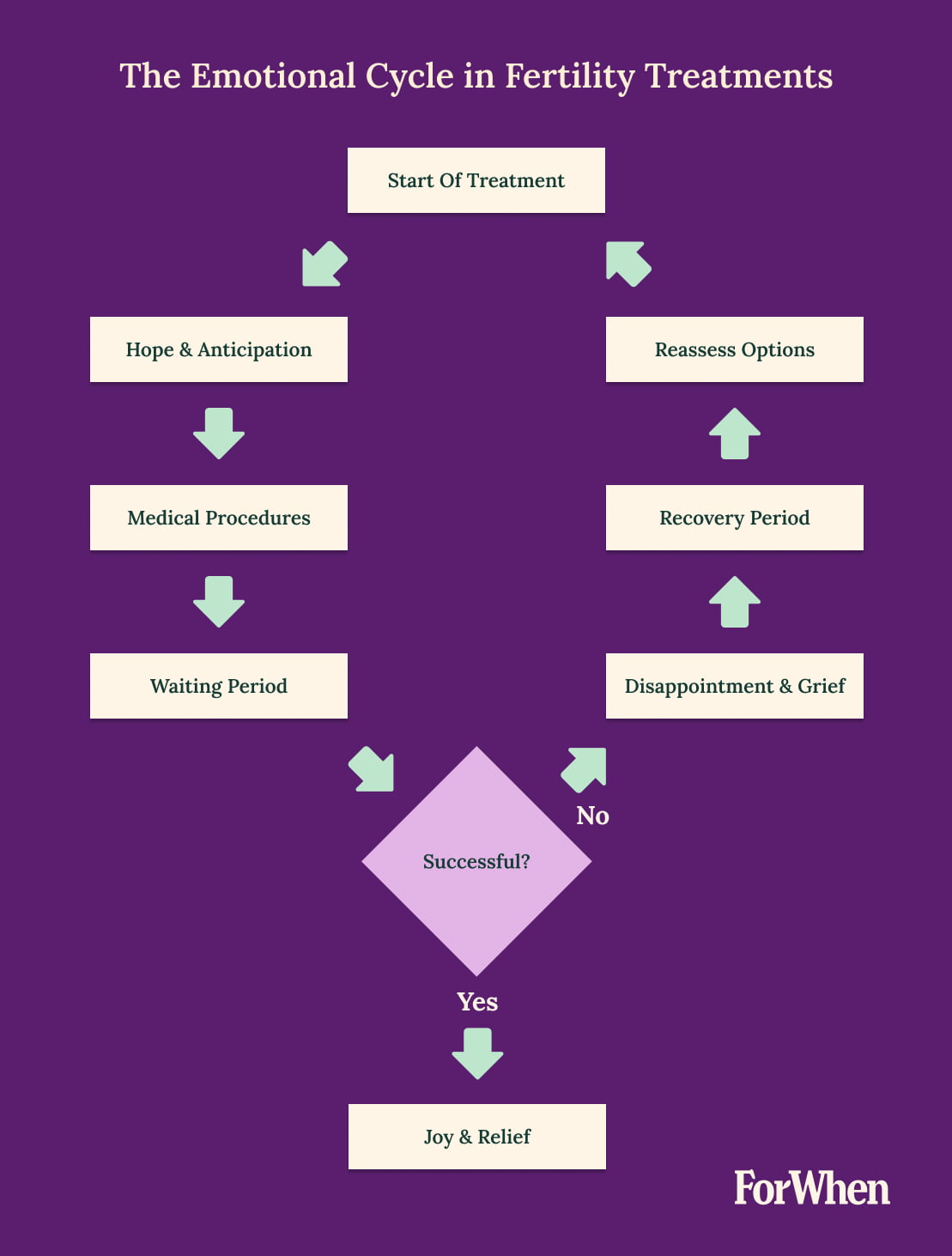This blog was authored by ForWhen Navigator Astrid S. Tiefholz RNM, IBCLC, CMHN, CEDC-MH Counsellor.
Posted August 2024
DOWNLOAD PDF VERSION
Trying to have a baby is not as straight forward as many people believe. It can take months to fall pregnant, if not longer.
Many couples may even need to explore infertility treatment to help them become parents, and some may never be able to have their own biological children but there are still many options available to them.
Everyone’s journey is different.
That’s so true, everyone’s journey is different and the subject of infertility is a very emotional topic, but we want you to know, you are not alone. You may be having a hard time falling pregnant and are feeling some pretty strong emotions. It doesn’t seem fair. We get it.
In this blog, we are going to look at how experiencing difficulties while trying to fall pregnant can affect your emotional health and how you can look after yourself while going through this journey.
The Taboo Surrounding Infertility
Historical perspective
Throughout history, not being able to have children has often been misunderstood and blamed on personal faults or seen as punishment. This has created an unfair culture of shame and secrecy about the issue.
The social stigma of infertility
Infertility continues to carry ongoing stigma, particularly for women. Society expects women to have children and be mothers, which creates a lot of pressure. The pressure to fall pregnant can cause a lot of emotional pain, making women feel guilt, distress and isolation, and that they are not good enough. It also makes it difficult to talk openly about their experiences, especially when struggling with the expectations of others.
Key Highlight
Breaking the silence around infertility is crucial in providing support and resources for those affected, fostering a more understanding and compassionate society.
Why are we reluctant to talk about mental health issues with infertility
People experiencing infertility often don’t talk about the affects on mental health because they’re afraid of being judged, feel like others don’t understand, and might find it too personal to share.
People often think that struggling to get pregnant is just a physical problem, not realising how much it can affect a person’s mental health. For example, using a treatments like in-vitro fertilisation (IVF) involves a lot of physical procedures, but many overlook the emotional strain and distress of dealing with healthcare teams and following strict schedules and rules.

The Emotional Toll of Infertility
Infertility can lead to serious mental health challenges such as depression, anxiety, low self-esteem, and emotional distress. The psychological effects of infertility can be particularly difficult, with many women and men experiencing heightened anxiety and depression.
The cycle of hope and despair in assisted reproductive technology treatments
The journey through fertility treatment is an emotional rollercoaster. Each cycle brings a fresh sense of hope, along with the fear of disappointment and can end in sadly, also grief. Experiencing this repetitive cycle of anticipation and potential heartbreak can take a toll on your mental well-being.
Stress and anxiety
The uncertainty and lack of control that comes with trying for a baby, including undergoing fertility treatments, can lead to significant mental distress, including stress and anxiety. The pressure of medical procedures, financial stress and the constant fear of failure can result in high levels of anxiety, making it crucial to find ways to maintain emotional balance.
Depression
For many, the emotional strain of infertility can cause a more serious, depressive episode. The grief of unfulfilled dreams, the sense of loss, and the constant reminders of others’ fertility can be hard to manage.
If you are feeling depressed or showing signs of depression, reach out to your health professional for support or call ForWhen on 1300 24 23 22 to speak to a local clinician who can help support and guide you to mental health services tailored to your needs.
Other emotional symptoms
When having difficulties conceiving, you may experience a variety of emotions including:
- Grief: experiencing loss, unfulfilled dreams and the constant reminders of others’ fertility can trigger a state grief which can also lead to depression.
- Guilt and shame: Societal and personal expectations can create feelings of guilt and shame.
- Loneliness: The difficulty of discussing your troubles becoming pregnant can lead to you avoiding others and loneliness.
- Anger and resentment: Frustration with the situation and envy towards those who appear to conceive easily can fuel anger and resentment.
- Low self esteem and self-worth: Not being able to have children can make someone feel less of themselves and affect their sense of who they are.
- Emotional Exhaustion: The ongoing emotional stress can drain your energy and cause burnout.
- Hormonal Changes: When trying to become pregnant, you may experience strong mood swings, anxiety and depression because of hormonal changes. These hormonal changes can be caused by several factors including a chronic illness like endometriosis, by taking fertility hormones, or by going through a miscarriage or a failed IVF cycle.
It’s no wonder you’re feeling overwhelmed! Remember, you are not alone.
Infertility is Not Just an Issue for Women
Did you know?
1 in 3 infertility problems are issues to do with the woman
1 in 3 infertility problems are issues to do with the man
1 in 3 infertility problems:
- are to do with fertility issues in both partners
- have an unknown cause
While conception difficulties affect both genders, the psychological effects can look different for men and women including gender diverse people.
The societal expectations
Society often expects women to take on the role of motherhood, but the woman’s partner might feel frustrated and powerless if they can’t solve the problem for their significant other. This can be tough for everyone involved! Male infertility, like low sperm count, can also challenge a man’s sense of identity and their wish to be a dad. Talking to a professional who understands these challenges can be very helpful.
LGBTQIA+ Community: The additional layers of complexity for non-heterosexual couples
For people in the LGBTQIA+ community, trying to become a parent can be hard. In addition to the emotional strain, some may face other challenges including discrimination, lack of understanding from healthcare providers and legal barriers, which all add to the challenges and impact of infertility. Getting help from supportive services can make a big difference.
The Domino Effect on Relationships
Friends and Family
Struggling to get pregnant can impact not only you but also your relationships and social circles. It can be hard when your friends and family are pregnant and everyone is sharing in the excitement, attending baby showers, but you feel envious or anger towards the situation. It can also be tough managing healthy relationships when a family member becomes too emotionally involved in your journey and they cross boundaries.
Romantic Relationships
Infertility can also put a lot of pressure on romantic relationships. Different ways of coping and different ideas on when to take a break can create stress between partners. This can lead to poor communication, less intimacy, and emotional exhaustion. This comes right at the time when you need each other’s support the most.
Social Isolation
Many people facing infertility might stop seeing their friends and family to avoid painful reminders or insensitive comments. This self-imposed isolation can deny them access to important support systems and increase feelings of loneliness.
The Importance of Having a Strong Support Network
Having a strong support network, including loved ones, a mental health practitioner, health professionals or others who have experienced similar struggles, can can be really helpful in dealing with the emotional ups and downs of infertility. Understanding, empathy and a listening ear can provide much-needed solace.
Professional Help
Getting professional counseling or therapy can help you manage the emotional effects of infertility. Making use of your specialist fertility team who are with you on this journey, or other qualified therapists can provide strategies, emotional support, treatment, and guidance through the complex decision-making processes involved.
Support Groups
Joining support groups that offer a safe space for you to share your experiences, thoughts, feelings and strategies to manage all these challenges can be invaluable. Bonding with others can remind you you’re not alone in this.
Mindfulness and Self-Care
Including mindfulness practices in your day, such as meditation, yoga, or deep breathing exercises, have been shown to help manage stress and anxiety levels. Taking time for self-care can help you find relief from the emotional stress of infertility. It’s ok to do things that make you happy or help you relax, like enjoying a cup of tea or taking walk through the park. In fact, it is vital!
Journaling
Many people find writing their feelings and thoughts in a journal help them process what they are going through. It can also be a record of your battles and strengths to look back on and reflect on your journey. You might be surprised at how far you’ve come, what you’ve learnt about yourself and others along the way.
Online resources
Online resources like blogs, reliable information, and forums or groups can give you the power of knowledge and connect you with others facing similar challenges to help support you through your journey.
Breaking the Taboo
Talking openly and honestly about the emotional stress and mental health effects of trying to have a baby can help reduce the stigma around infertility. Education and bravery in these conversations are key.
Key Highlight
A strong support network of family members, loved ones, mental health practitioners, and others with similar experiences can be so important when navigating the emotional journey of infertility.
How to start a conversation
Talking about the challenges of trying to fall pregnant and how it affects your emotions can be hard, but it’s important for building understanding and support. If you’ve been trying to have a baby for 9-12 months, it might be time to see your doctor. Seeking help to find the cause of your issues may open the door for treatment options you didn’t know existed.
The power of sharing personal experiences to destigmatise the issue
Sharing your personal experiences, even though being vulnerable can be hard, is a powerful way to reduce feelings of shame, anxiety, and loneliness for yourself and others facing infertility. Talking about these struggles helps you build resilience, raise awareness, challenge misunderstandings, and encourage others to seek help and support.
Your mental health matters
Infertility is a complex journey that can take a huge toll on emotional well-being. It’s time to break the silence and acknowledge the emotional turmoil that comes with this experience.
Remember, your mental well-being matters, and you are not alone in this journey.

Options for Mental Health Support During Fertility Treatment
Deciding to undertake fertility treatment is not anything to be ashamed of and is something many people go through.
Before starting your treatment journey, it is important to discuss the best options for your situation with your team of health professionals as some will require mental and physical health screenings to proceed. When considering fertility treatment options, remember to look after your mental health as well.
Some services who can help your mental health are:
- ForWhen: Call us on 1300 24 23 22 to speak to a local clinician who can help support and guide you and your partner to perinatal mental health services tailored to your needs.
- PANDA National Helpline: A helpline offering support and counselling for individuals experiencing perinatal anxiety and depression.
- Gidget Foundation Australia: Provides support services and resources for individuals and families experiencing perinatal mental health issues, including infertility and assisted reproduction.
Actionable Steps for Those Struggling
Be kind to yourself: Trying to conceive is a challenging journey, so don’t forget to be kind to yourself and avoid self-blame. Recognise that your emotions are valid and that seeking support is a sign of strength, not weakness.
Seek professional support: Don’t hesitate to reach out to a counsellor, therapist, or professional who specialises in infertility counselling. They can provide valuable coping strategies, and emotional support.
Join a support group: Connecting with others who “get it” can provide a safe space to share experiences and find strength in the community.
Practice self-care: Prioritise activities that promote relaxation, joy and emotional well-being. This can include mindfulness practices, exercise, hobbies, or simply taking breaks from the emotional intensity of the journey while you are trying to conceive.
Build a support network: Surround yourself with loved ones who can offer understanding and support. Don’t hesitate to communicate your needs and boundaries with those around you.
Educate yourself: Seek information from reliable sources to better understand the emotional aspects of infertility. Knowledge can help you make informed decisions and advocate for your mental well-being.
Frequently Asked Questions
See our answers below to commonly asked questions we receive about infertility’s relationship with mental health.
Yes it is entirely normal and common to experience feelings of depression while navigating the emotions of infertility treatments.
The constant cycle of hope and disappointment, the physical and emotional strain and the uncertainty of the journey can contribute to symptoms of depression. It is crucial to acknowledge and address these feelings by seeking professional support and engaging in self-care practices.
Dealing with insensitive comments or unwanted advice can be hurtful and frustrating. It’s important to remember that these comments often stem from a lack of understanding.
Consider having an open and honest conversation with the person, explaining how their words have made you feel and setting clear boundaries for future discussions. Additionally, surround yourself with a supportive network of individuals who can offer empathy and understanding.
While the relationship between stress and infertility is complicated, research suggests that high levels of stress can potentially impact fertility. It’s important to note that stress by itself is not the only cause of infertility, and many other factors play a role. Managing stress through healthy coping mechanisms and seeking support can be helpful for both mental well-being and overall fertility.
Deciding to take a break from infertility treatments is a very personal decision. If you find yourself feeling levels of stress, anxiety, or depression that negatively impacting your day and quality of life, it may be time to consider a pause.
Pay attention to warning signs such as strained relationships or feeling like you can’t cope. Remember, your mental health is just as important as your physical health and taking a break can provide the necessary time to recharge and reassess your next steps. Talking with your healthcare provider or mental health professional can help you make an informed decision that prioritises your overall well-being.
Receiving fertility treatments and mental health support can cause financial stress. Although available resources vary by location and situation, there are options to explore. Some healthcare plans might cover part of the costs for counseling or therapy related to infertility.
Additionally, non-profit organisations and support groups may offer low-cost or sliding-scale services for mental health support. Discussing any financial concerns with your healthcare providers is also a good option as they may be able to guide you toward budget friendly mental health resources.
Wherever you are in your journey, remember your mental health is just as important. You are not alone and there are support options available to help you through this time.

